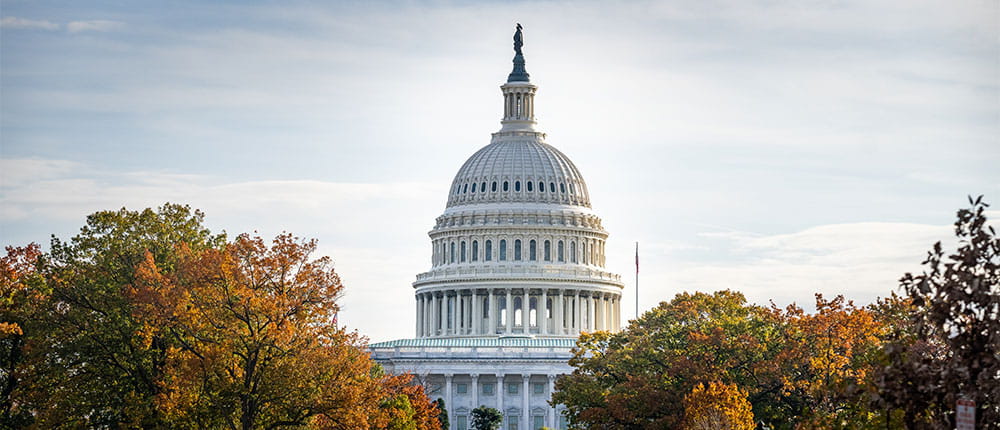Every four years, eyes across the U.S. focus on the 99 counties in Iowa, home to the Iowa caucuses. These nonbinding votes lay the groundwork for presidential election contenders, typically serving as a preliminary vetting for presidential candidates with viable campaigns.
Although it has the most visibility, the presidential election is just one of many 2024 elections that will be significant. As illustrated in the 2022 elections and the resulting redistricting battles, local elections matter to CHS producer-owners.
Rural America is losing representation in the electorate, so being engaged and informed is more important than ever. The CHS government affairs team tracks and engages in state and federal elections across the country, building awareness for owners through advocacy and education.
Starting now
Nov. 5, 2024, is election day, but voting began in Iowa on Jan. 15, 2024. Caucuses and primaries are held throughout the country, paving the road to the White House. A caucus is a group of political leaders who meet to choose a candidate for president. A primary is a regular election, preceding the general election, where votes are cast for a candidate for office from a specific political party.
In 2016, several caucus states shifted to a primary structure, leaving just five states with caucuses: Iowa, Missouri, Nevada, North Dakota and Wyoming. Iowa conducts the first presidential caucus and New Hampshire kicks off the primary schedule. The last primary is scheduled in Massachusetts on Sept. 17, 2024, leading the final stretch to November.
Some states have open primaries, which allow voting outside a party, while other states have closed primaries, which require voting within a party. While different in process, both a caucus and primary serve to cast a vote for a presidential nominee.
Congressional landscape
All 435 U.S. House of Representatives seats are up for election in 2024. At the time of publication, dozens of announced retirements mean there will be 22 Democrat and 11 Republican open seats, leaving a tossup for control of the thin Republican majority in the U.S. House.
A similar story can be told in the U.S. Senate, where one-third of the 100 senators are up for reelection. In addition to the 33 members regularly up for reelection, seven members (five Democrats and two Republicans) are not seeking reelection. In the U.S. Senate, razor-thin Democratic control is at risk, making each U.S. Senate race highly competitive.
Several states within the CHS footprint have high-profile races that will draw significant national attention. In Montana, Sen. Jon Tester (D) faces a strong challenge by several Republicans, and the Ohio race is likely to run tight to the finish.
Two special elections for partial terms are scheduled for Nov. 5, 2024, for U.S. Sens. Ben Sasse (R–Nebraska) and Dianne Feinstein (D–California), who did not serve out their current terms.
State leaders
Of the 11 states that have elections for governor this year, the CHS government affairs team will be closely following the races in Indiana, Missouri, Montana, North Dakota and Washington. Other governor elections will occur in Delaware, New Hampshire, North Carolina, Utah, Vermont and West Virginia.
With policy issues increasingly originating at the state level, outcomes of state executive races and state legislative elections are also of note. As we have seen over the past 12 to 18 months, state executives and legislatures are becoming more vocal regarding energy policy, international trade and agriculture workforce issues, which significantly impact CHS owners.
Across the country, 44 states will have state legislative races. These are not as visible as federal elections, with a fraction of the money spent on media and digital advertising compared to presidential campaigns, but work done at the state level can drive policies that guide congressional action and set policy precedents.
Topping the list of policies to watch for CHS are regulatory revisions to existing low carbon fuel standards (LCFS) in California and Washington and consideration of LCFS proposals in Midwestern state legislatures. These potential new regulations require emissions reductions through use of lower-carbon-intensity fuels, including renewable fuels, and electric vehicles. Congress has been working to develop a separate policy that mirrors several of the guidelines created at the state level, further exemplifying how state policy can contribute to federal policy development.
Get involved
To learn more about your state election, go to your state election resource provided by the secretary of state website for a complete caucus or primary and general election calendar. As a U.S. citizen, voting is one way you can participate in the election process and serve your civic duty. Every vote counts and every vote matters.
This election year outlook is the first in a CHS political education and engagement series to empower owners in the political process. CHS government affairs is excited to bring opportunities for CHS owners to participate in advocacy by promoting a public policy agenda that supports the interests and issues impacting CHS and the cooperative network.
Learn more about CHS government affairs activities.
Check out the full Winter 2024 C magazine with this article and more.




